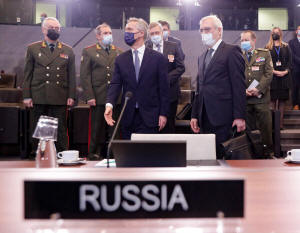'No ultimatums': Russia sets out security demands at NATO meeting
 Send a link to a friend
Send a link to a friend
 [January 12, 2022]
By Robin Emmott [January 12, 2022]
By Robin Emmott
BRUSSELS (Reuters) - Russia laid out its
demands for security guarantees in Europe to NATO's 30 allies on
Wednesday but insisted they were not ultimatums following intense talks
with the United States in Geneva that failed to break the deadlock.
NATO Secretary-General Jens Stoltenberg received Russian Deputy Foreign
Minister Alexander Grushko at allied headquarters to try to defuse the
worst East-West tensions since the Cold War over Russia massing troops
near its border with Ukraine.
Moscow has dismissed concerns expressed by the United States that it may
be planning to invade its neighbour and Kremlin spokesperson Dmitry
Peskov said live-fire exercises on the Ukraine border on Tuesday were
not linked to the NATO talks.
"We are not negotiating from a position of strength; there is not, and
nor can there be, any place for ultimatums here," he said in Moscow as
the talks were getting underway in Brussels.
But he said pan-European security was at a critical point and the West
needed to respond to Russia's concerns about NATO activities in former
communist countries it sees as its backyard.
NATO allies say the talks, the highest-profile attempt at the alliance
to turn a potential conflict over Ukraine into a political process, are
taking place because of Russian aggression, not the other way around.

"Let's be clear: Russian actions have precipitated this crisis. We are
committed to using diplomacy to de-escalate the situation," U.S. envoy
to NATO Julianne Smith told reporters on Tuesday evening.
"We want to see ... Russia pulling back its forces," she said of the
100,000 troops stationed near Ukraine.
'DIALOGUE, NOT NEGOTIATION'
NATO diplomats say the Western alliance would consider it a success if
Russia agreed to hold further talks. Allies are ready to negotiate with
Moscow on increasing openness around military drills and to avoid
accidental clashes that could spark conflict, as well as arms control
regarding missiles in Europe.
[to top of second column]
|

Russian Deputy Foreign Minister Alexander Grushko and NATO Secretary
General Jens Stoltenberg are seen during NATO-Russia Council at the
Alliance's headquarters in Brussels, Belgium January 12, 2022.
Olivier Hoslet/Pool via REUTERS
 But the NATO allies say that many of
Russia's demands, laid out in two draft treaties in December, are
unacceptable, including calls to scale back the alliance's
activities to 1990s era levels and promising not to take in new
members.
Bridling at NATO's expansion eastward into its old Soviet sphere of
influence, the Kremlin sees the U.S.-led alliance's deterrents and
military modernisation as a threat.
Russia sounded a downbeat note over prospects for more talks with
the United States on Tuesday.
Grushko, a former Russian ambassador to NATO, has said Russia wants
to avoid confrontation. His direct colleague Deputy Foreign Minister
Sergei Ryabkov - who held talks with the United States in Geneva but
who was not in Brussels on Wednesday - has said Ukraine must never
be allowed to join NATO.
NATO has no immediate plans to admit Ukraine, but says Russia cannot
dictate its relations with other sovereign states.
Talks will continue this week in Vienna at the Organization for
Security and Cooperation in Europe (OSCE), a broader body where
Russia, the United States and Europeans are represented.
"Our main goal is, in principle, to establish a dialogue. I think it
is worth noting separately that there are no negotiations as such
this week," U.S. ambassador to the OSCE, Michael Carpenter, said
according to a U.S. transcript of an interview with Russia's TV Rain
(Dozhd) published on Wednesday.
(Additional reporting by Francois Murphy in Vienna and Dmitry
Antonov in Moscow; editing by Philippa Fletcher)
[© 2022 Thomson Reuters. All rights
reserved.] This material may not be published,
broadcast, rewritten or redistributed.
Thompson Reuters is solely responsible for this content. |